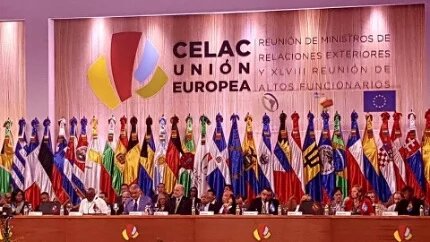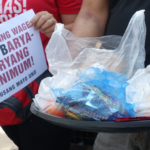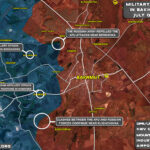Zelensky Latino?
A summit between the European Union (EU) and the Community of Latin American and Caribbean States (CELAC) will be held on 17-18 July 2023. The aim is to strengthen ties between the two organisations. It will also be an opportunity for Europe to revive the moribund trade agreements with Mercosur [Euronews 2023c]. Finally – and most importantly – it is feared that the EU will use the summit with CELAC to encourage Latin America to get involved in the Russia-NATO conflict in Ukraine. This EU action will be supported by an NGO campaign for “peace and solidarity”.
The EU has always regarded Latin America as a third-world region that must obey it. This explains the ease with which Josep Borrell, who holds the EU’s highest diplomatic post, glorifies Europe’s colonising dynamics [El País CR 2022], or compares Europe to a “garden” in danger of being invaded by the “jungle” that surrounds it [El País 2022].
The war in Ukraine is the central axis of the EU’s foreign policy, and thus of its agenda towards Latin America. This is reflected in Borrel’s statement that “the European Union will build relations with other countries based on their attitudes towards Russia and China” [Censor.net 2023]. This position was also expressed by German Foreign Minister Annalena Baerbock, who reminded the 59th Munich Security Conference that “neutrality is not an option, because it puts you on the side of the aggressor” [US Department of State 2023].
Belgian NGOs and the Social Democrats are already preparing the ground for the EU and NATO by leading “a campaign for peace” with the publication on 14 June 2023 of a policy note1 [Europe for Peace and Solidarity 2023]. Although the NGOs in this note critically distance themselves from NATO, they endorse imperialist policies on two key points:
a. the denial of any legitimacy of Russian intervention;
b. the denial of repeated attempts by the Russians to negotiate a peace agreement guaranteeing Ukraine’s neutrality.
Regarding the legitimacy of the intervention in Ukraine, the NGOs of the platform “Europe for peace and solidarity” unreservedly echo NATO’s discourse: “Russia intervened to stop the advance of the Atlantic Alliance and occupy Ukraine. In that case, the intervention is indeed unlawful and illegal”.
However, the explanation given by Russia is different and has never been seriously analysed by NGOs and social democrats, who are quicker to denounce “Putin’s regime” [PVDA 2023] than to try to understand the reasons for the Russian Federation’s intervention in Ukraine.
It is true that Russians have been annoyed by the expansion of NATO, but it is mainly the withdrawal of the United States (and thus NATO) from disarmament treaties that really worries Russia. Putin has been vocal about this since the Munich Security Conference in 2007. So it was not this issue that prompted the launch of the special operation.
The real reason cited by the Russians to justify their intervention in Ukraine is their responsibility to protect the people of Donbass. They are victims of numerous abuses by Kiev, such as the “Law on the Indigenous Peoples of Ukraine”2 adopted on 1 July 2021, which is inspired by Nazi racial laws and deprives Ukrainian minorities of their constitutional rights. Since 2014, Kiev has been waging a war against Russian-speaking populations, which has resulted in 14,000 deaths, including 3,404 civilians [UN 2022]. This war intensified with Zelensky’s signing of the decree of 24 March 2021 launching the recapture of Crimea and southern Ukraine. The military presence in the south of the country has been strengthened to the extent that Western intelligence agencies have noted signs of an imminent Ukrainian offensive in the Donbass [Baud 2022].
Russia has therefore intervened on the basis of the “responsibility to protect”, a principle adopted by the United Nations in 2005 [UN 2023]. This principal rests on three fundamental pillars
a. A state’s responsibility to protect its own population – which the Ukrainian state failed to do in relation to the Russian-speaking population of Donbass.
b. The responsibility of the international community to help Ukraine solve its internal problems. German Chancellor Angela Merkel and French President François Hollande have both admitted that they never intended to apply the Minsk agreements, which were supposed to protect the population of Donbass [Reuters 2022, Kyiv Independent 2022].
c. This explains Russia’s recognition of the two Donbass republics with which Russia signed friendship and assistance treaties, which not only sealed the legitimacy of the special operation but also its legality.
The NGO signatories of the European Platform for Peace not only deny the legitimacy of the Russian intervention. They also refuse to acknowledge, along with NATO, Russia’s repeated attempts to resolve the conflict diplomatically. Since the special operation began, the Russians have been involved in a number of peace negotiations. Vladimir Putin recently made public the first peace agreement signed by 3Ukraine [Boscnic 2023]. However, Ukraine has not fulfilled any of its obligations and has preferred to continue on the path of war. Although the signing of the peace treaty was recently made public, NGOs could not ignore these negotiations as the press covered them, as well as attempts by NATO countries to sabotage the peace [Ucrainska Pravda 2022]. Western warmongering was also confirmed by Israeli Prime Minister Bennett [MR Online 7 February 2023].
Thus, two discourses on peace emerge. The first, put forward by NGOs and European social democrats, supports NATO’s position by claiming that this war is illegitimate because it is simply the expression of a clash between two imperialist powers, US and Russian. The refusal to recognise the diplomatic efforts of both Russia and the countries of the Global South means joining the pax americana, which presupposes a coup in Russia followed by the Balkanisation of the region4 [New Eastern Europe 2022]. This pax americana would not only mean the disappearance of the Russian Federation, but also jeopardise all developments towards a multipolar world whose construction has been accelerated by the war. In short, these NGOs act against the interests of the Latin American countries with which they claim solidarity.
The second peace position is that of the Global South. It is logically based on an analysis of US imperialism. The most successful proposal on this subject is that of China [FMA 2023], which contains three essential ideas for sustainable peace:5
a. recognition of the sovereignty of all countries;
b. abandoning the Cold War mentality, which is based on the idea that security is enhanced by increasing military blocs – this is a fundamentally anti-NATO statement;
c. the need to end unilateral sanctions.
The Chinese analysis is consistent with Latin American history, characterised by more than five hundred years of colonialism and imperialism. Spanish colonisation has given way to the domination of US imperialism, which also imposes its foreign policy on the EU. European bodies regularly pass resolutions imposing unilateral sanctions on Latin American countries, but also deny the legitimacy of elections in Venezuela, Nicaragua and Bolivia [EEAS 2020, ABC Internacional 2021, Council of the EU 2021, Swissinfo 2023]. Following the US lead, the EU has justified coups in Bolivia and Peru [Público 2019, EU 2022], accuses Cuba of not respecting “political pluralism and fundamental freedoms” [Politico 2021, EEAS 2023] and participates in smear campaigns against progressive presidents.
It therefore makes sense that the majority of Latin American countries have not endorsed NATO’s demands and have refused to send arms to Ukraine and apply sanctions against Russia. Zelensky’s tour of Latin America was a failure6, as was the bickering between the United States and Germany over Soviet military equipment7. During her visit to Brazil on 7 June 2023, German Foreign Minister Annalena Baerbock even lamented the fact that “Brazilians are more interested in the price of rice and beans than in events taking place 11,000 km from their homes”. The 30% of Brazilians living below the poverty line [Neri 2022] are therefore urged to pay more attention to Europe’s problems than to their own…
On the other hand, Russia is keen to build its diplomatic relations within the framework of international law; it has never encouraged a coup or questioned the legitimacy of a government. Moreover, Russia conducts trade on equal terms, without depriving Latin American countries of their natural resources or labour8. This explains the warm encouragement Russia has received from several Latin American countries, including Cuba, Nicaragua and Venezuela [Cuba Minrex 2023, France 24 2022, Prensa Latina 2023]. Raúl Castro even assured his confidence in the Russian victory, stating that “Cuba will support all measures taken by Russia in the context of the Ukrainian crisis” [Sana 2023].
Latin American countries have no intention of getting involved in the conflict in Ukraine and they condemn the imperialist attitude to dictate their foreign policy. Russia’s victory is seen by Latin American countries as an opportunity, as it will strengthen the commitment of the multipolar world. That is why the vast majority of them refuse to subscribe to the pax americana. In short, the CELAC countries refuse to sing the colonial refrain against it. It is a song they know all too well [Euronews 2023b], which continues to set the rhythm of the continent.9
The NGOs of the European Platform for Peace and Solidarity, however, campaign for the pax americana even as they show solidarity with Latin America. Our fear is that they are preparing the ground to impose the support on Zelensky at the summit, despite opposition from Latin American governments. Several information sources close to the Spanish far-right confirm this hypothesis, which is all the more realistic given that Ukraine is experiencing a real military debacle and that the EU and US economies are falling into recession [Financial Times 2023, Kenningham 2023].
It is therefore urgent for the West to involve the countries of the Global South in this war. NATO can then count on the human rights NGOs to lobby to put this issue on the agenda of the EU-CELAC summit. It would be a major political defeat for Latin America if the Atlantic agenda were to prevail.
Europe’s problems do not concern Latin America, which has not been at war for decades. On the contrary, the region is looking for long-term stability so that it can develop outside the imperialist yoke of the US and the EU.
Whatever happens, Zelensky will never become a Latino and he may not rise to the top!



